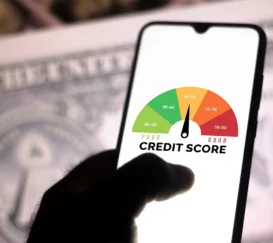Building credit is a long process everyone goes through. However, it may seem like a vicious cycle at some point. While you need to demonstrate responsible financial behavior to start growing your credit score, most lenders are unwilling to lend money to people without a strong credit history.
Fortunately, credit-builder loans can come to the rescue. They are designed specifically for individuals who want to build credit from scratch or improve their less-than-perfect scores.
Credit-builder loans don’t require good credit to qualify. And this is not the only difference between them and regular personal loans. Let’s take a closer look at how credit-builder loans work and how they impact your credit history
- Credit-builder loans are designed to help people with a limited credit history establish a record of positive financial behavior.
- Each debt payment is reported to one or several credit bureaus. By making on-time loan payments, you can boost your credit score, while late payments can drop it.
- With a credit-builder loan, you make monthly payments upfront and get the money on hand only after the loan is paid off.
- You can get a credit-builder loan from banks, credit unions, CDFIs, or lending circles.
How Does a Credit-Builder Loan Work?
A credit-builder loan is a financing option that helps people with credit issues or no credit establish a positive payment history. These loans differ from traditional personal loans. In fact, they function in the opposite way.
When it comes to a regular loan, you get the borrowed amount in your bank account and can use it for your personal needs. But with a credit-builder loan, you need to make your monthly payments upfront without getting any money in advance.
The lender opens a locked savings account and stores your money in it until the loan term ends. Once you have paid off your loan, you get your funds back and can use them toward your savings goals or current financial needs. The amount you can get is typically between $300 and $1,000. The repayment terms range from 6 to 24 months.
Like with any other loan options, credit-builder loans involve interest rates you need to pay in addition to the initial amount. However, some lenders may return you dividends for holding your money in their savings account.
What Impact Do Credit-Builder Loans Have on Your Credit History?
Credit-builder loans impact your credit by helping you create a positive payment history. While the history of your payments makes up 35% of your credit score, it’s an important element of your overall creditworthiness. Each time you pay on schedule, a lender reports your payment to major credit bureaus. This way, you show reliable financial behavior and boost your credit score.
However, if you fail to pay on time, it will work against your credit profile. Late payments will negatively affect your credit report, lowering your FICO rating. Thus, it can reverse the effect and undermine the effort you made to build strong credit. Therefore, you need to be responsible and approach a credit-builder loan with caution.
How to Get a Credit-Builder Loan?
A credit-builder loan falls under the category of loans that are quite easy to get. You don’t need to meet any strict credit score requirements or have a good credit standing. However, you still may be subject to a hard credit check.
To apply for a credit-builder loan, you need to choose the lender and fill out its application form online or in a store. Additionally, you may be asked to provide the following information and documents:
In most states, you need to be at least 18 years old to qualify for a credit-builder loan. If you’re self-employed, you need to provide tax returns to confirm your income.
Who are Credit-Builder Loans Good for?
Credit-builder loans are good for people who want to establish a strong credit history. According to the Consumer Financial Protection Bureau, most individuals who apply for credit-builder loans have no existing debts and are often first-time borrowers. Those who already have bad or poor credit also use these loan options to improve their current ratings.
Where Can I Find Credit-Builder Loans?
Credit-builder loans are not widely advertised. They are typically offered by small financial institutions, community services, and not-for-profit organizations. Here’s where you can find a credit-builder loan in your area:
Locally owned banks
Community banks are usually focused on helping economically disadvantaged individuals and households access extra financing and build wealth. They often offer credit-builder loans and report loan payments to three major credit bureaus. You can find a suitable bank near you with the help of the Independent Community Bankers of America’s search tool.
Credit unions
A credit union is a member-owned, not-for-profit organization. Credit unions often offer loans, including credit-builder options, at low interest rates to their current members. To become one, you need to meet a certain requirement, such as living in the local area, working in a specific organization, or paying a minimum monthly deposit.
Community Development Financial Institutions (CDIFs)
There are more than 1,400 CDFIs in the United States. They are mission-driven organizations that are aimed at helping low-income communities generate financial growth and opportunities. Among other things they do, CDIFs offer various financing programs that help borrowers with low credit scores get extra money and build credit and wealth. You can find a certified CDIF by using the locator.
Lending circles
Different community organizations may offer interest-free loans that are aimed at helping peer groups build strong credit. The monthly payment amount is determined by the group, and each member contributes the agreed-upon sum to a designated fund by a predetermined date. On-time payments are reported to three main credit bureaus, helping participants with their credit-building goals. To find a lending circle in your area, visit the Mission Asset Fund website.
Pros and Cons of Credit-Builder Loans
Credit-builder loans come with their advantages and drawbacks. Consider them from all angles to make an informed decision.
Pros
- May establish strong credit. By paying timely, you can build a good credit history. This will improve your chances of getting future financing at good terms.
- Can build savings. You can consider a credit-builder loan as an emergency fund or a piggy bank to finance your future needs.
- Lenient requirements. Credit-builder loans are easier to qualify for. You can get one even with bad or no credit.
- Low APRs. Loans that build credit usually come at lower costs compared to other borrowing options.
Cons
- You don’t get the money upfront. A credit-builder loan works mostly like a savings account. Before you get the money on hand, you need to make on-time payments upfront.
- Your credit score may go down. If you pay late or miss your payments, this loan can negatively affect your credit history.
- Interest rates and fees will be applied. Besides your initial loan amount, you should also pay interest on it.
What are Other Ways to Improve Credit Scores?
Besides a credit-builder loan, there are a few more options that can help you improve your credit scores:
Get a secured credit card
Secured credit cards work similarly to regular ones but require an upfront deposit. This deposit typically serves as your credit limit. If you manage to pay off your balance on time, your credit scores will increase, and the deposit will be refunded to you. Over time, you may be offered to convert them into regular credit cards with a higher limit.
Apply for a secured personal loan
A secured personal loan can be a great way to boost credit scores for people with no or poor credit. It’s more accessible than an unsecured one due to the collateral you provide. As the lender can repossess your pledge if you default, giving you such a loan becomes less risky for them. Your payments are also reported to major credit bureaus.
Take out an unsecured personal loan
Just like with a credit-builder loan, an unsecured personal loan can boost your credit score if you make on-time payments. However, the difference lies in their accessibility. You’re most likely to be denied an unsecured loan with no or low credit score. Even if you qualify, you typically face higher interest rates and less favourable loan terms.
Integrate your bills into your Experian FICO score
The tool called Experian boost allows individuals to add eligible rent, utility, cellphone, and some streaming service payments into their Experian FICO score. This way, you will be able to build credit without going into debt. However, this tool won’t help you with TransUnion and Equifax credit scores.
Become an authorized user
One more way to boost your credit is to become an authorized user. To do this, you need to add your profile to a credit card holder with good or excellent credit. The account history of the primary user’s credit card will then be displayed on your credit report.
FAQ
Can I use a personal loan to build credit?
You can use a personal loan to build credit if you meet the lender’s eligibility requirements. In most cases, borrowers with no credit face problems when they try to get personal loans. Therefore, these loans will suit you more if you have at least fair credit and want to continue growing it.
What will happen after a credit-builder loan is paid off?
Once you paid off your credit-builder loan, the lender will transfer the initial amount back to you. In some cases, you may receive dividends earned from your savings. You will also establish a credit score.
Is it possible to pay off a credit-builder loan early?
You can pay off a credit-builder loan early by covering the remaining principal balance at once. Just keep in mind that it will limit your credit-building opportunities.
How much do credit-builder loans increase my credit score?
If you have no other existing debt, a credit-builder loan can increase your credit score by about 60 points.

